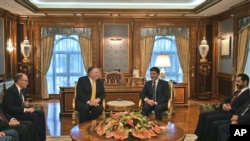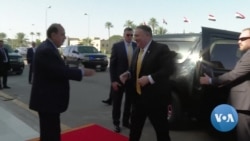U.S. Secretary of State Mike Pompeo met with top Iraqi officials Wednesday during an unannounced visit to Baghdad.
Pompeo's visit coincided with the anniversary of the Iraqi national police force. A police band serenaded Prime Minister Adel Abdul Mahdi, who presided over the celebration before meeting Pompeo in private.
A spokesman for the secretary said the two men discussed "the U.S. commitment to Iraq's sovereignty and territorial integrity," as well as the new Iraqi government's "efforts to deliver stability, security and prosperity to all Iraqis." The men also discussed efforts to "ensure the lasting defeat of ISIS in the region."
Pompeo also met with Iraqi President Barham Salih and parliament speaker Mohammed al-Halbusi. Salih told the secretary that Baghdad "will need the support of (U.S. troops)," and expressed his "gratitude to the U.S. for its support, over the years." He added that "ISIS is defeated militarily, but the mission is not (fully) accomplished." Halbusi discussed U.S. efforts to help Iraq "with reconstruction and investment."
Iraqi analyst Hani Ashour, who teaches political science at Baghdad University, told Sky News Arabia that the "Iraqi parliament was due to debate U.S. troop levels in Iraq Thursday, following protests by some political parties over fears the U.S. was moving troops it was withdrawing from Syria to Iraq." He said that Secretary Pompeo "reassured Iraqi leaders that was not the case," prompting a cancellation of Thursday's parliament debate.
Iraqi political analyst Hazem al-Shammari told Al-Arabiya TV that Iraqi leaders are caught between U.S. and Iranian wishes, given that Iran has called on the U.S. to withdraw its troops completely from Iraq. "Given the divisions among Iraq's political leaders," he argued, "It is a strategic mistake to stick Iraq in the midst of the quarrel between the U.S. and Iran," since Iraqi politicians "might not be able to withstand the pressure."
WATCH: Pompeo Reassures Iraqi Leaders Ahead of a Major Speech in Cairo
Joshua Landis, who heads the Middle East program at the University of Oklahoma, tells VOA that Secretary Pompeo is facing a strategic dilemma in Iraq:
"America's position in Iraq, like its position in Syria, is on thin ice, because Iran -- in Iraq -- has really won the day and ultimately we've seen that the rise of sectarian sensibilities and sectarian animosities in the larger Middle East has undermined America's position and strengthened Iran's position, because Iran is (a majority) Shi'ite country...and the U.S. is seen to be a pro-Saudi, pro-Sunni, pro-Gulf country," said Landis.
Theodore Karasik, a Washington-based Gulf analyst, tells VOA that Pompeo's visit was the "third by a senior U.S. official to Baghdad in as many weeks," and he was hoping to "reassure (Iraqi leaders)...about the restructuring of (U.S.) forces and operations in the region."
Karasik said he believed that energy issues were "another important facet of the visit" along with discussions over the sanctions regime (regarding Iran) and the "logistic flow of oil in the region and protection of that flow."
He says that in conjunction with Pompeo's Middle East visit, US National Security Adviser John Bolton has set the stage for a meeting in Oman, for the further development of what has been dubbed the Middle East Security Alliance, a NATO-like partnership that would include the U.S. and its Arab allies.








